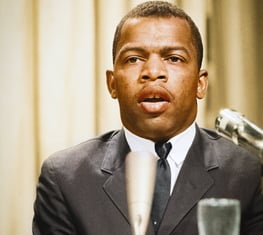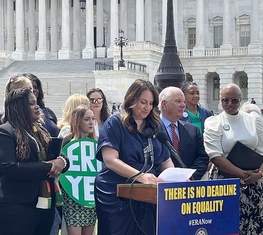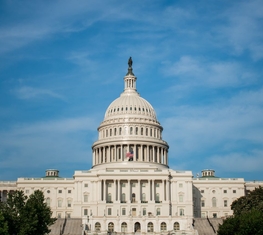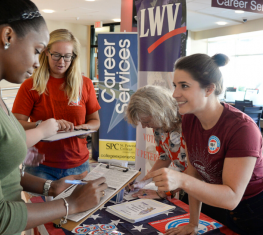Testimony by Virginia Kase on Voting Rights And Election Administration In America
STATEMENT BY VIRGINIA KASE, CHIEF EXECUTIVE OFFICER
LEAGUE OF WOMEN VOTERS OF THE UNITED STATES (LWVUS)
U.S. HOUSE COMMITTEE ON HOUSE ADMINISTRATION, SUBCOMMITTEE ON ELECTIONS
HEARING STATEMENT: VOTING RIGHTS AND ELECTION ADMINISTRATION IN AMERICA
THURSDAY, OCTOBER 17, 2019
Chairwoman Fudge, Ranking Member Davis, and Members of the Subcommittee, my name is Virginia Kase and I serve as the Chief Executive Officer at the League of Women Voters of the United States. Thank you for the opportunity to testify today on ‘Voting Rights and Election Administration in America,’ an issue of paramount importance to our organization.
The League of Women Voters is nonpartisan, founded nearly 100 years ago in 1920 by women who understood the importance of securing voting rights for women. The League is active in all 50 states as well as the District of Columbia and with 764 local affiliates in every congressional district in the country.
In 1965, the Voting Rights Act outlawed racial discrimination in voting and established procedures to protect equal access to the vote for everyone. Despite a long history of support from legislators of all political parties, in 2013, the Supreme Court overturned key provisions of the VRA in the case of Shelby County v Holder. Since that decision, politicians across the country have passed unnecessarily restrictive legislation and adopted practices that discriminate against and disenfranchise voters of color and minorities whose first language is not English -- making it harder for them to register and much more difficult to vote.
These restrictive legislative initiatives included efforts to implement voter photo ID requirements in states like Texas, Wisconsin, Missouri, and Pennsylvania. We pushed against efforts to roll back early voting hours in Ohio and eliminate pro-voter reforms like pre-registration and same day registration in North Carolina. Essentially, the Shelby decision weakened the Voting Rights Act as a mechanism to fight discrimination by striking down important pre-clearance and oversight provisions.
These suppressive laws have a major impact on our elections; excessive, long lines in urban areas where minorities reside; consolidation of polling sites with little or no notice; reduction in early voting hours that limit participation; massive voter purges with no effective notice that causes registration barriers on Election Day, and inadequate numbers of machines in areas where early voting showed a clear influx in voter participation. And because these issues repeatedly show up in areas with large minority populations, in states like Georgia, Florida, North Carolina, Arizona, Michigan, Ohio, and Texas, it is unlikely that this scheme was incidental or unintentional but instead expressly targeted the growing population of the New American Majority, including minorities, youth, and income-sensitive individuals.
In effect, these suppressive laws shut out millions of the New American Majority, and denied citizens the protection of their right to vote.
With these minority-targeted voting barriers road tested, the 116th Congress has a momentous opportunity to restore voting rights in this country. The opportunity to strengthen the Voting Rights Act by creating a new formula that would trigger pre-clearance of certain changes to voting laws and administrative practices is needed now more than ever. And the creation of a national notification process, that lets all voters know when changes to elections processes may occur ensures that voters are informed prior to them showing up to the polls on Election Day.
If Congress fails to act immediately, this will be the first redistricting cycle to occur without a fully functioning Voting Rights Act and will allow states to push through unjustifiable changes to their laws that will have a direct impact for voters for a decade. Without continued oversight and safeguards in place to protect voters from all backgrounds, it is left to organizations like the League of Women Voters and other nonprofit voting rights groups to inform and protect voters affected by these policies and practices.
But that should not be the sole role of the League and our partners; it is the responsibility of government to create and enforce laws that prevent barriers in the democracy our forefathers designed to foster an open, transparent government powered by the people, for the people, all of the people.
It is the duty of government to protect the rights of voters and to encourage participation in our political system, not create barriers that prevent participation. As we have for nearly 100 years, the League looks forward to working across the aisle to determine the points of consensus for any and all voting rights legislation considered before Congress. And we look forward to working with elected leaders to protect and uphold their responsibility of ensuring voters have the unobstructed ability to exercise their right to vote.
Thank you again for the opportunity to testify on the importance of restoring the Voting Rights Act and I look forward to taking questions and continuing to work on this important issue.
Sign Up For Email
Keep up with the League. Receive emails to your inbox!
Donate to support our work
to empower voters and defend democracy.




